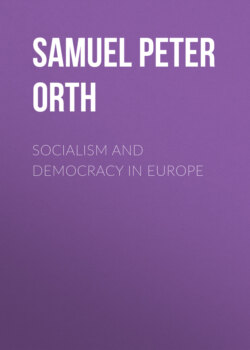Читать книгу Socialism and Democracy in Europe - Samuel Peter Orth - Страница 17
На сайте Литреса книга снята с продажи.
FOOTNOTES:
Оглавление[1] Marx, Revolution and Counter-Revolution in 1848.
[2] Marx, Revolution and Counter-Revolution, p. 70.
[3] Op. cit., pp. 123–124.
[4] Marx, Die Klassenkämpfe in Frankreich, pp. 26–28.
[5] See the third address issued by the International Workingmen's Association on the Franco-Prussian war, 1870–71.
The Italian Socialists in Milan, June, 1871, closed a rhetorical address to the Parisian Communards as follows: "To despotism they responded, We are free.
"To the cannon and chassepots of the leagued reactionists they offered their bared breasts.
"They fell, but fell like heroes.
"To-day the reaction calls them bandits, places them under the ban of the human race.
"Shall we permit it? No!
"Workingmen! At the time when our brothers in Paris are vanquished, hunted like fallow deer, are falling by hundreds under the blows of their murderers, let us say to them: Come to us, we are here; our houses are open to you. We will protect you, until the day of revenge, a day not far distant.
"Workingmen! the principles of the Commune of Paris are ours: we accept the responsibility of its acts. Long live the Social Republic!"
See Ed. Villetard, History of the International, p. 342. This sentiment was also expressed in London and other centers.
[6] Introduction to Die Klassenkämpfe in Frankreich, p. 8.
[7] Kautsky, Leben Friedrich Engels, p. 14, Berlin, 1895.
[8] The Epoch of Reform, p. 190.
[9] Engels, Condition of the Working Classes in 1844, p. 230. Engels, who came to England at this time and was employed in Manchester in his father's business, and was therefore in the heart of the movement, says that Chartism was, after the Anti-Corn Law League had been formed, "purely a workingman's cause." It was "the struggle of the proletariat against the bourgeoisie." "The demands hitherto made by him (the laborer), the ten-hours' bill, protection of the worker against the capitalist, good wages, a guaranteed position, repeal of the new poor law—all of these things belong to Chartism quite as essentially as the 'Six Points.'"—Supra cit., pp. 229, 234, 235.
